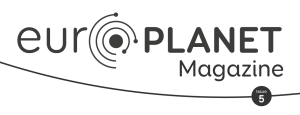The Last Word – Steps to Collaboration
Nigel Mason, President of the Europlanet Society, reflects on efforts to build a more collaborative European space science community
Read article in the fully formatted PDF of the Europlanet Magazine.
The recent Europlanet Research Infrastructure Meeting (ERIM) in Bratislava (In Focus) included a workshop that brought together Research infrastructures (RIs) and networks whose focus is on space research – from cosmology and the birth of the Universe to astrobiology and the origins of life. Europe is one of the leading international centres in this field, with strong academic and industrial communities. However, European research is, by necessity, multinational, which can bring challenges in cross-border collaboration and effective integration. The European Space Agency (ESA) comprises 22 full member states and cooperates with additional European Union (EU) members, as well as international partners. Most EU-funded projects are also international co-operations, involving both EU member states and, increasingly, partners around the world. The Europlanet 2024 Research Infrastructure (RI) project currently has partners in 23 countries across 5 continents. The Europlanet Society is open to members in every European country and beyond.
As well as being multinational, space science is also inherently multidisciplinary; a wide range of fields are required to further the exploration and – increasingly – the exploitation of space (see Planetary Perspectives on asteroid mining). The Europlanet Science Congress now attracts contributions from aeronomy, astrobiology, astrochemistry, astrophysics, cosmochemistry, geosciences, heliophysics and meteoritics. Europlanet, therefore, increasingly overlaps and collaborates with other research communities. Networks and RIs in related fields include the highly successful Radionet (radio astronomy) and Opticon (optical-infrared astronomy) RIs, the recently established ChETEC-Infra RI (dedicated to nuclear astrophysics) and ESCAPE (the European Science Cluster of Astronomy and Particle physics ESFRI research infrastructure). Europlanet is also engaged with strategic networks such as ASTRONET and ESFRI (the European Strategy Forum on RIs), which provide wider overviews of space research and suggest future strategic directions.
The ERIM workshop was a timely review, given the context of strategic plans for ESA, the EC (through the Horizon Europe programme), ESFRI and ASTRONET (see In Focus) that are currently being developed and published and will shape the future of European space research over the next decades. Participants in the workshop agreed that a more cohesive and powerful voice for the space research community to key stakeholders is now needed. An important step to achieve this will be the creation of a ‘Network of Networks’ that brings together the different space and astronomy organisations to discuss areas of mutual interest, collaborate in joint activities, and make collective approaches to major funders and stakeholders. Discussions on the establishment of this ‘Network of Networks’ are progressing and the first meetings are planned for September 2023. This is a welcome milestone in the development of a sustainable space science community for Europe


